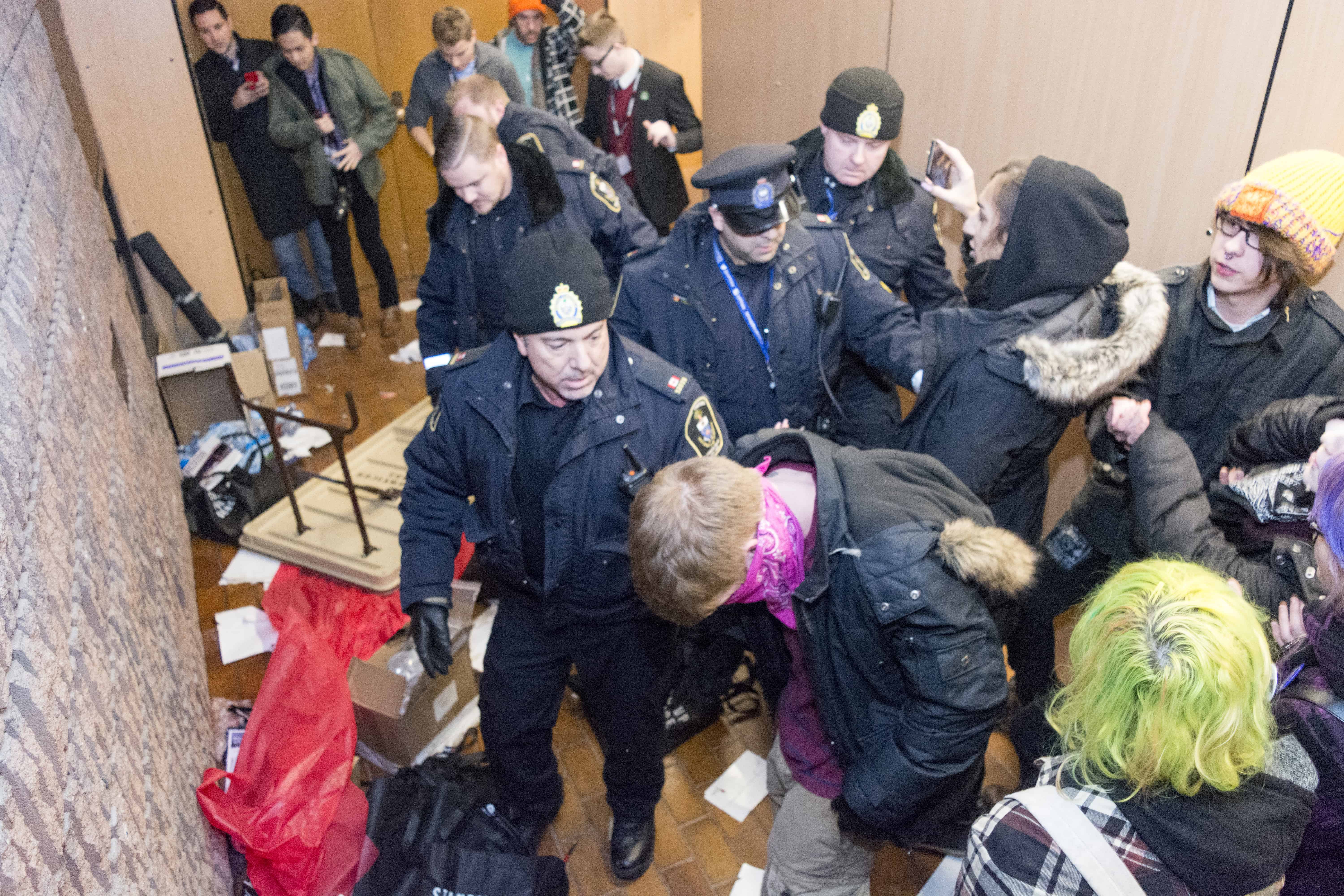Recent and notable cases of self-proclaimed ‘anti-fascist’ demonstrators forcibly disrupting campus events are cause for concern with respect to both public safety and freedom of speech. As a University of Toronto student, I am deeply concerned about the events that have transpired both at U of T and the University of California, Berkeley over the past weeks.
At Berkeley, in response to the announcement that right-wing provocateur Milo Yiannopoulos was slated to speak on campus, masked protesters set fire to public property, smashed windows and doors with crowd-control barricades, and assaulted and pepper-sprayed both bystanders and Yiannopoulos supporters. This culminated in Yiannopoulos being escorted off campus in a bulletproof vest.
While the protests were comparatively tame here at U of T, campus and city police were called in response to protesters at the Toronto Action Forum, a conference featuring speakers such as Ezra Levant and Jordan Peterson.
One protester attempted to lunge past an officer, as The Varsity reported in its news coverage of the incident. The event was ultimately derailed when someone pulled a fire alarm — a violation of Section 437 of the Criminal Code of Canada — which resulted in chaos and forced security to shut down the event.
Among other motives, these criminal activities were targeted towards fighting against hate speech. Yet perhaps we will have a better idea of whether the rhetoric of Yiannopoulos, Levant, and Peterson truly represent hate speech if they are actually allowed to speak first.
The ability to voice your opinions, no matter how controversial or unpopular they may be, is one of the cornerstones of a functioning democracy. It disturbs me greatly that suppression of these opinions occurred on university campuses, places that traditionally facilitate and encourage the unfettered exchange of knowledge and ideas.
I am fully aware that there are necessary contextual restrictions on all freedoms, freedom of speech included. Laws against hate speech exist to protect our most vulnerable and to maintain the civility of our society. As of late, however, the term ‘hate speech’ has been hijacked by various groups to describe any opinion that does not conform to one’s own, sometimes with bizarre results.
For instance, the prospect of Yiannopoulos — a gay, Jewish immigrant — advocating hate against people like himself is absurd, and yet he has been accused of being homophobic, anti-Semitic, and xenophobic by many who disagree with his opinions.
It is easy to avoid controversy, ignore differing opinions, or slap a label on someone because their views are offensive. Yet, as intellectuals and future leaders of society, we cannot in good conscience declare one opinion to be superior when we have not given any others a fair chance.
The violent shutdown of speech on campus is ironic, particularly when supporters allege it to be in the name of preserving a safe space on campus. If someone’s views are truly hateful, they should be defeated with reason and logic, not intimidation and censorship.
Everybody has the right to protest, and I imagine that the majority of those involved in the protests were only there to represent their views and not incite violence. What is troubling, however, is the muted response by authorities against those who did carry out violent acts.
The U of T administration has yet to issue any official statements regarding the protests against the Toronto Action Forum. South of the border, the mayor of the city of Berkeley took the time to tweet that “Hate speech isn’t welcome in [the] community,” and only added his disapproval of the violence used to shut it down as an afterthought.
While the protests at Berkeley were indeed more violent than the protests at U of T, both shared the common goal of shutting down free speech — a goal that should be treated with the same level of condemnation.
We are living in an age where individuals are condoning the use of physical violence to express disapproval, and descending a slippery slope where crime is being normalized, as long as it is committed from a misguided moral high ground. The right to peaceful protest should be protected, but smashing doors and windows should not.
Violence is never justified, and it is important to condemn it when it is carried out to silence others. Yet, in a gross display of cowardice, universities have stayed quiet on this issue, or have even taken the side of violent perpetrators.
U of T ought to loudly and publicly denounce the individuals who disrupted the Toronto Action Forum for what they are: anti-democratic, dangerous, and criminal. What the university should also do is invite speakers like Yiannopoulos, Levant, and Peterson to the university — demonstrating that we value free speech and polite debate, and that we will not be intimidated by extremists who resort to violence to silence opposing views.
Robert Zhang is an Industrial Engineering student currently completing his professional experience year.


